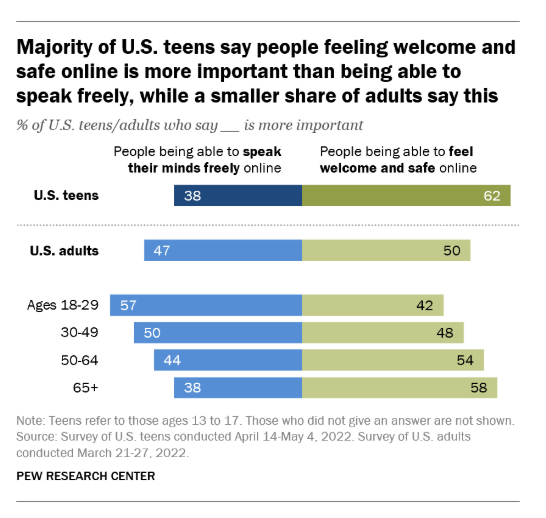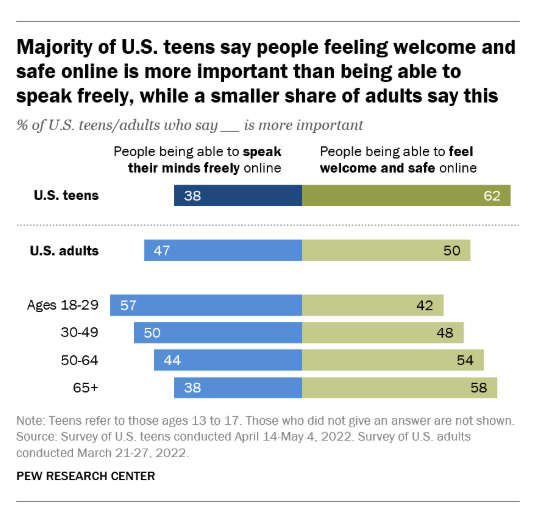Last week, Attorney General Pam Bondi went on The Katie Miller Show and claimed that the First Amendment does not protect hate speech. Speaking in the aftermath of Charlie Kirk’s murder, and of the disturbing celebration of Kirk’s death in some leftist circles, she said:”There’s free speech, and then there’s hate speech. And there is no place — especially now, especially after what happened to Charlie — [for that] in our society.”
Bondi is wrong. There is no distinction between free speech and so-called hate speech. While the First Amendment does include narrow exceptions (such as incitement to violence and true threats), hate speech is firmly protected by the First Amendment.
One reason for this is that “hate speech,” as a category, is impossible to define. Consider the phrase, “I hate Charlie Kirk, because he was a bigot.” Is that speech hateful, or is it just expressing righteous anger? Your answer probably depends on your politics and on how you saw Kirk — that is, your answer is subjective.
Because what constitutes hate speech is inherently subjective, it would be impossible for any government to define hate speech in an objective way. When governments do outlaw hate speech, they invariably use these vague and overbroad laws to punish speech that the government’s agents themselves happen to hate. In 2023, for instance, a French woman was fined 12,000 euros for insulting French President Emmanuel Macron.
In fact, Kirk himself understood this concept well. He wrote that: “Hate speech does not exist legally in America. There’s ugly speech. There’s gross speech. There’s evil speech. And ALL of it is protected by the First Amendment. Keep America free.” It is darkly ironic for Bondi and the administration to invoke Kirk’s death in an effort punish free speech that Kirk himself firmly opposed.
When free speech experts criticized her statement, Bondi took to X to try to clarify her stance. She wrote that: “For far too long, we’ve watched the radical left normalize threats, call for assassinations, and cheer on political violence. That era is over.”
But this statement simply muddies the waters in ways that suggest that Bondi herself may not understand the nuances of the laws she is tasked to enforce. True threats are already illegal. Calling for someone to be assassinated is actually legal, unless it meets the high bar set by the Supreme Court for incitement in Brandenburg v Ohio (that is, speech can be banned if said speech is “directed at inciting or producing imminent lawless action” and is also “likely to incite or produce such action”).
Even if someone went on X and posted that maybe it wouldn’t be such a bad thing if someone were to take out Trump or Biden, it wouldn’t meet the Brandenburg standard.
Cheering on political violence is generally pretty awful, but it’s also clearly protected because it represents a political opinion. Consider the Soviets who cheered when Joseph Stalin was killed. Should their expression of joy have landed them in prison? Cheering on political violence might be gross and evil in most situations, but as Kirk himself understood, the First Amendment does not just protect speech that we ourselves happen to like.
Bondi isn’t the first government official to pretend that so-called hate speech is not protected by the First Amendment. Former Vice Presidential candidate Tim Walz went on MSNBC to argue that, “There’s no guarantee to free speech on misinformation or hate speech, and especially around our democracy.”
This invites an important question: Why are many politicians on both the left and the right so eager to punish constitutionally protected speech? For one thing, they want electoral support. The fact is, going after hate speech is popular.
According to a 2022 Pew survey, 50 percent of American adults believed that “People being able to feel welcome and safe online” was more important than “People being able to speak their minds freely online.”

On the left, many oppose letting racists and other bigots speak. On the right, Bondi made her comments in the aftermath of Kirk’s death, when plenty of conservatives expressed shock and outrage at the leftists who danced on Kirk’s grave. When politicians propose to ban these types of speech, they’re appealing to the demographics who believe that “being able to feel welcome and safe online” is of primary importance. At the same time, they’re paying lip service to the idea of free speech by trying to separate it from so-called “hate speech” so as not to be seen opposing a core American value. In short, they’re trying to have their cake and eat it too.
The second reason that some politicians want to outlaw hate speech may be more sinister. The fact is that whichever regime first succeeds in banning hate speech will gain an enormous political advantage, because they will be able to define hate speech in such a way that the new ban will hurt their political opponents.
In so doing, they would be able to place a fat thumb on the scale of any debate in the land. Consider, for example, how the debate over trans athletes would evolve if people who expressed the view that trans males don’t belong in women’s sports were silenced and thrown in jail for expressing a “hateful” sentiment.
Such politicians would also be able to thin the ranks of their political opponents. Consider what would happen if Bondi succeeded in criminalizing speech that celebrated Kirk’s death, for instance. The roster of Democratic activists, donors, and voters would be thinned. That’s putting a thumb on the scale, not just of a single issue, but of democracy itself.
In Matal v. Tam, Supreme Court Justice Samuel Alito wrote that, “the proudest boast of our free speech jurisprudence is that we protect the freedom to express ‘the thought that we hate.’”
Trying to ban hate speech is an affront, not only to Kirk’s memory, but to the heart of what makes us American.
For the sake of our nation, we need to reaffirm that free speech includes even speech that we ourselves might hate. Criminalizing speech not only violates the Constitution but also strikes at the heart of what it means to be American.
